| |
| |
Photographer,
Location, Date |
Larger images |
Comments |
|
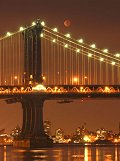
|
Gary J. Cooper,
New York City
Mar. 3, 2007 |
#1,
#2, #3,
more |
Forecasts for
uncooperative weather in New York City were thankfully inaccurate.
An amazing vision as the moon in complete totality rose
over the Manhattan Bridge and the East River!
Photo
details: Nikon
D100, ISO 200, 10 second exposure |
|
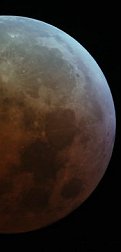
|
Eva
Seidenfaden,
Trier, Germany
Mar. 4, 2007 |
#1,
#2, #3,
#4 |
It
was a fairly bright eclipse, but what surprised me most
were the incredible blue and turquoise shades of Earth's
penumbra. Photographs do not do it justice. |
|
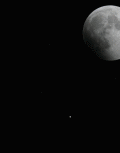
|
Tunc
Tezel,
Kas, Antalya, Turkey
Mar. 4, 2007 |
#1 |
This
passage of the Moon through the shadow of the Earth starts
at 2130 UT, with roughly 5-minute intervals during most
of the eclipse (and 10-minute intervals during totality),
ending 3 hours 45 minutes later, at 0115 UT.
Photo
details: I used a Canon
EOS 300D and a Meade
8" LX10 SCT with a focal reducer to take the pictures.
This gave a focal length and ratio of 1250 mm f/6.3, just
perfect for a digital SLR. The camera was set to ISO 100
for all exposures. For the partial eclipse (showing only
sunlit Moon) the exposures were around 1/250-1/30 seconds.
For the deep partials, 2 to 20 seconds and for the total
eclipse all were 20-second exposures.
|
|

|
Anthony Ayiomamitis,
Northeastern outskirts of Athens, Greece
Mar. 3, 2007 |
#1, more |
I have been
following with GREAT interest the discussion surrounding
colors of the latest eclipse. Having taken over 100 images
up to the end of totality, I have also uncovered a wealth
of colouration during the various stages of the eclipse
and which have been assembled into a mosaic. It seems each
phase of the eclipse had its own particular shade of colour.
|
|
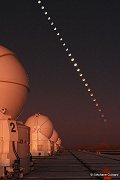
|
Stephane Guisard,
Paranal Observatory, Chile
Mar. 3, 2007 |
#1,
more |
Chaplet of telescopes (the 4 Auxiliary Telescopes of the Very Large Telescope Interferometer) and Moons....
|
|
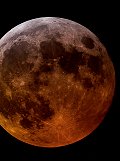
|
Philippe Morel,
Syracusa, Italy
Mar. 4, 2007 |
#1,
more |
Photo
details: Canon
10D, Celestron
Nexstar 5-inch telescope stopped at f/10. Three pictures
composited, 10 sec, 6 sec and 3 sec exposure on 800 ISO
equivalent sensibility. |
|
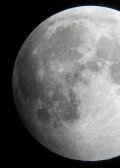
|
John Talbot,
Abingdon, Oxfordshire, UK
Mar. 3, 2007 |
#1 |
I was interested
to see Luigi Fiorentino's images of the penumbra using subtraction
of two images taken before and after the Moon entered the
penumbra: see gallery
page 6. This image is an image I took at 21:22:30 UT
when the Moon was almost completely within the penumbra
yet was 7 minutes away from entering the umbra (21:29:58
UT at my site). The darkening of the penumbra towards the
direction of the Earth's umbra is clearly visible.
Photo
details: Canon
Ixus 750 compact digital camera at the eyepiece of a
200mm f/4 Newtonian telescope. 1/320s exposure at f/2.8.
ISO 50, focal length 7.7mm. |
|
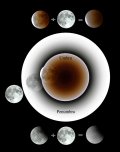
|
Ivan
Goncalves,
Nimes, France
Mar. 3, 2007 |
#1 |
This image of
the shadow of the Earth is calculated with some pictures
of the recent moon eclipse (03/03/2007). Each image of the
eclipsed moon was divided by the image of the full moon
(reference) to eliminate the variation of reflection light.
The curve of light was then extended on all surface of the
shadow. the umbra is to amplify 1000 times compared to penumbra.
Photo
details: Celestron
8 + Nikon
D70 digital camera. |
|
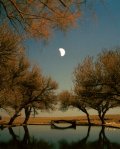
|
Ali
Matinfar,
Maranjab desert, Iran
Mar. 5, 2007 |
#1,
#2,
|
Photo
details: Yashica analog camera, Konica film, asa
400 |
|
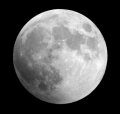
|
Denis Joye,
Boulogne near Paris (France)
Mar. 3, 2007 |
#1 |
This movie is made of 2 pictures captured during the eclipse (first contact and second contact with earth shadow). It shows the changing aspect of moon under parallactic effect. It gives an evaluation of the angle between earth polar axis and lunar orbit at eclipse time.
|
|
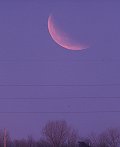
|
Doug Zubenel,
Powell Observatory near Louisburg, Kansas.
Mar. 3, 2007 |
#1,
#2 |
Monsieur Murphy
must have been on vacation tonight as we had crystal clear
skies for the rising eclipse. This is a 2 second exposure
@ f/11 with a 135mm
Nikkor lens on Fuji
Velvia 50. |
|

|
Josť Serrano Agustoni,
Macať - Rio de Janeiro - Brazil
Mar. 3, 2007 |
#1,
#2, #3,
more |
Clear weather favoured this beautiful spetacle. We made a star party with more than 30 neighbours to watch the eclipsed moon.
|
|
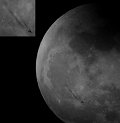
|
Luis Santana,
Stargeezer Star Party at Garland, Texas
Mar. 3, 2007 |
#1 |
Was taking pictures
of the Lunar Eclipse during a Star Party when I saw a plane
crossing the face of the eclipsed Moon.
Photo
details: Pentax
Optio digital camera. Afocal Photograph using an Orion
6in Dobsonian with a 25mm Plossl eyepiece. |
more
images: from
Csaba Hadhazi of Csaba Hadhazi, Hajduhadhaz, HUNGARY; from
Alain BUISSON of Nanteuil Les Meaux France 60km east of Paris;
from
Alan C Tough of Birnie, Moray, Scotland; from
Domenico Licchelli of Gagliano del Capo, Italy;
|
|